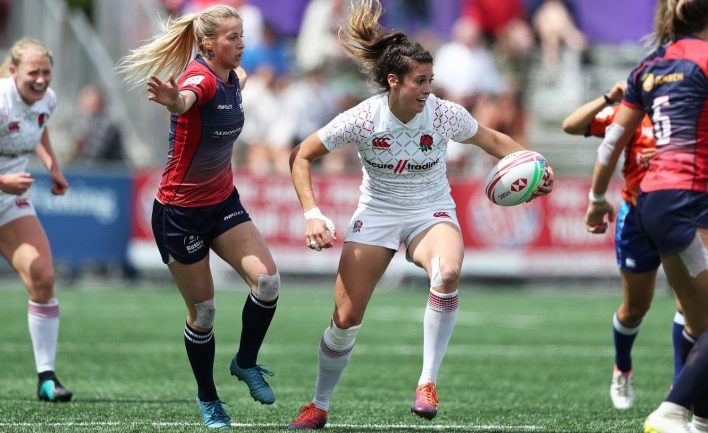It’s now fourteen months to the Women’s Sevens tournament at the Tokyo Olympics. The big event takes place on July 31 and August 1 2020. How do the Red Roses’ prospects look?
Back in 2016 Simon Middleton, then the England 7s Head Coach, said it was the second day of a two-day tournament that really mattered. Only then could a team discover how good it was.
Last month out in Kitakyushu the Red Roses delivered the goods, losing the final to Canada only at the last breath. There were some close calls on the way, but they thoroughly deserved their achievement.
At the next event in Langford, British Columbia, they were unable to repeat the triumph of their win there over New Zealand in the 2016 final.
The stand-out result was the loss by a mere 2 points to the Black Ferns on the first day. They showed discipline, skill and resolve. Only the placement of the two tries proved too wide even for a drop-kicker of Holly Aitchison’s ability.
That is one of the inbuilt weaknesses of Sevens. Some of the greatest tries are scored wide-out after a dazzling passage of play. By contrast a chance interception will lead to an untroubled run-in of 75 metres and a gimme conversion.
Then to the all-important second day. This time the French squad reversed the result in Japan (15-17), winning by the decisive margin of 26-12. This helped to strengthen their confidence after they had had the temerity to beat New Zealand 29-7 the previous month.
So the current standings of the two nations were repeated: England holding sway at 15s, France proving a shade too strong at 7s.
The Roses saw off Russia a second time – no mean feat, given the power and pace the opposition can provide these days. But the 31-7 loss to Canada showed the distance they still have to travel.
Possession was given up too often for James Bailey’s comfort, and more experienced heads on the field might have avoided unwise options taken at crucial moments. But Canada are in a different class; this time round they didn’t have to work as hard as they did in the Kitakyushu final – England found themselves forcing the issue close to the opposition line; pressure off-loads didn’t go to hand, and the Maple Leafs are dab hands at exploiting any weakness presented to them.
What is the ideal blend of experience and youth in a Sevens squad? At present England are focussing on youth: the Langford Twelve included three 19-year-olds, Abi Burton, Helena Rowland and Ellie Kildunne, and Emma Uren (21), all at the start of their international careers. Claire Allan (missing this weekend), Abbie Brown, Heather Fisher, Alex Matthews and Amy Wilson Hardy are the only squad members with playing records dating back at least to 2015.
Of the contracted squad of 17 Holly Aitchison may prove to be the signpost to the future. If England want to separate off their two squads completely, she is the leading example of the type of player the Sevens management must cultivate. She fully deserved her selection in the Dream Seven at Kitakyushu, is the side’s main kicker and has an admirable range of skills. And significantly she is uncapped at 15s, though you could imagine Simon Middleton wishing he could convert her into a leading back for his World Cup squad. But he will know that that is next to impossible in the time available.
The only other senior player not to be capped at 15s is Deborah Fleming. It will be fascinating to discover whether any of the youngsters will ever gain international recognition at 15s. The temptation to try must be strong. One of the drawbacks of the HSBC Sevens set-up is that most players never have the chance to play in their homeland in front of their own supporters. The recompense is you get to see the world.
There is no doubting the England squad’s individual qualities, but when it came to the critical moments in the France and Canada games, risks were taken that proved unwise. The question is whether that 14-month gap to the Olympics will prove sufficient to overcome any shortcomings shown in this latest HSBC World Series tournament. The tensions will be much greater than anything they have known before.
The teams that gain success most often know when to take risks, and more importantly, when not to. One more deliberate ruck, and we will will score. One no-look pass out of the back door and…
The last stage of the HSBC series takes place at Biarritz (15-16 June).
These are the pools:
POOL A : New Zealand, England, Russia, Scotland
POOL B : Australia, Canada, Spain, Ireland
POOL C : USA, France, Fiji, China
Scotland replace Brazil as the invitation side
For the would-be spectator it’s either the rugby or the beach. What a decision. For the players it’s that second day syndrome. The Red Roses need a repeat of their Kitakyushu exploits.
The Langford results:
First Day
England 38 China 0
England 21 Russia 14
New Zealand 12 England 10
Second Day
Quarter-final: England 12 France 26
5th place semi-final: England 29 Russia 17
5th place play-off: Canada 31 England 7
England now sit sixth in World Rankings









